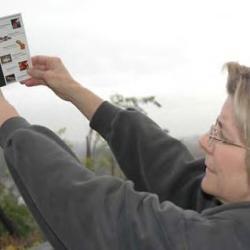Source Institutions
Source Institutions
Add to list Go to activity
Activity link broken? See if it's at the internet archive

This fun hands-on astronomy activity uses a variety of simple props to help learners understand why they see what they see in a telescope. They will learn about how the eye works, how to use the most powerful part of the eye to see more detail, and what to expect out of an experience observing through a telescope. The pdf contains step-by-step instructions, photos, presentation tips, detailed information about telescopes and the human eye, ready-to-print activity cards, and links to background information.
- Under 5 minutes
- 5 to 10 minutes
- $1 - $5 per group of students
- Ages 4 - adult
- Activity, Lesson/Lesson Plan
- English
Quick Guide
Materials List (per group of students)
- Field of View (FOV) cards for each participant to have one -- template included (print on card stock for durability)
- At least one copy of color squares/averted vision card (or one at each telescope) -- template included (print on card stock for durability)
- Regular ¼" hole punch
- 16-penny nail
- Small nail or push-pin
- Straight pin
- Scissors
- (Optional) Pictures or posters of astronomical images
Subjects
-
Earth and Space Science
-
Astronomy
- Stars and Galaxies
- Probes, Satellites and Spacecraft
-
Solar System
- The Moon
- The Planets
-
Astronomy
-
Physical Sciences
-
Light and Optics
- Sunlight and Color
-
Light and Optics
-
Life Sciences
-
Human Body
- The Brain and Nervous System
-
Human Senses and Perception
- Vision
- Perception
-
Human Body
-
The Nature of Science
-
The Scientific Process
- The Scientific Worldview
-
The Scientific Process
Informal Categories
- Outdoor Activity
Audience
To use this activity, learners need to:
- see
- see color
Other
Components that are part of this resource:
This resource is part of:
Access Rights:
- Free access
By:
Rights:
- All rights reserved, Astronomical Society of the Pacific, 2008
